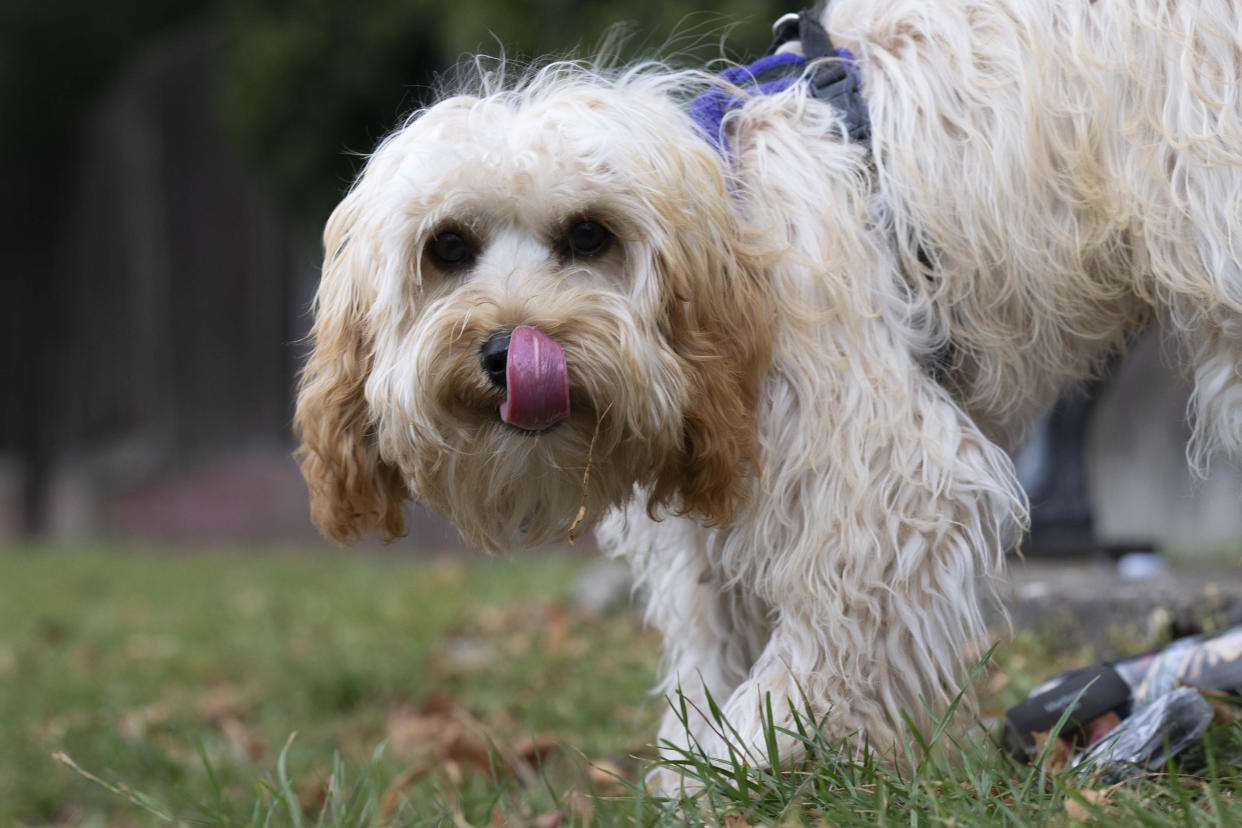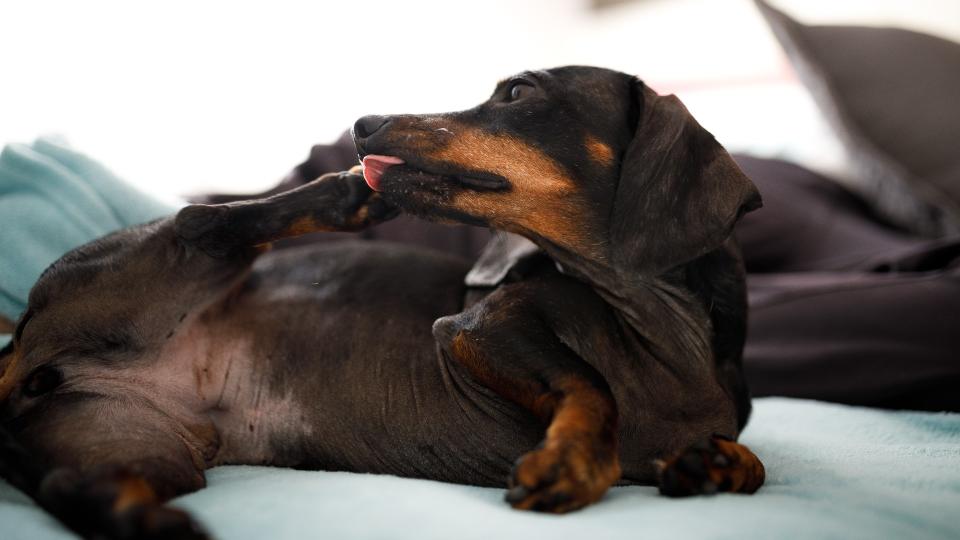Excessive licking in dogs: Vet's guide to causes and treatment

Excessive licking in dogs is an act that can test the patience of a saint. However, your dog isn't licking to be difficult. Excessive licking is a sign of a larger issue at play. The core reason for this behavior can stem from a large variety of both medical conditions and behavioral issues. Irrespective of the cause, all require investigation and treatment.
It is not recommended to ignore excessive licking or dismiss its importance. Discovering and treating the underlying reason why your dog licks a lot, whether this is their paws or elsewhere on their bodies, is the key to stopping this behavior.
Tests, veterinary care and treatments can add up, however, and chronic and excessive licking may turn into a lengthy and complex process to find the correct cause, therefore increasing your costs and expenses. This isn’t the same in all cases but it is a detail to factor in.
By taking out the best pet insurance before your dog experiences any health or behavioral issues, will help pay for most of these costs. It also gives you peace of mind and freedom to treat your dog how you wish to, when you want to. That ease is worth having and means you can keep your dog happy, healthy and your bank account wealthy.
What does excessive licking in dogs mean?
Licking is a normal behavior in dogs, and dogs may lick their owners as a sign of affection, to seek attention, or even just if they think their human tastes good!
When licking becomes excessive, however, it is usually a sign that something is wrong, as it can indicate anxiety, stress, boredom, pain, or an underlying health condition.
In general, a dog’s licking is considered excessive if they cause trauma to themselves or if the behavior interrupts their normal daily activities.
If a dog licks themselves continuously, one potential consequence is the development of acral lick dermatitis. This skin condition occurs when a dog licks or chews one area of skin, usually over the wrists or forearms, to the point of causing hair loss, red or thickened skin, oozing, and sometimes infection.
Licking can release endorphins in dogs, so this can become a repetitive cycle regardless of the initial trigger.
Is excessive licking a sign of pain in dogs?
Yes—excessive licking can be a sign of pain in dogs. Like humans rub painful areas to make themselves feel better, dogs lick painful areas to relieve some of the pain, or if they can’t reach, they may lick a closer body part like their front legs.
Common causes of excessive licking include arthritis and skin allergies, but there are numerous potential triggers.
Causes of excessive licking in dogs
The following medical issues can cause excessive licking in dogs:
Painful conditions of the bones, joints, and muscles including osteoarthritis, soft tissue injuries, fractures, and degenerative joint disease
Skin conditions such as external parasites (like fleas or mites), food or environmental allergies, skin cancer, and acral lick dermatitis
Gastrointestinal issues such as food sensitivities, dietary indiscretion, a sudden change in diet, inflammatory bowel disease, pancreatitis, and gastrointestinal parasites (like worms)
Infections of the skin, mouth, intestines, urinary tract, or reproductive tract
Anal gland impaction
Dental disease
Oral cancer
Hypothyroidism
Trauma

Is excessive licking a sign of anxiety in dogs?
Yes—excessive licking can be indicative of anxiety in dogs. When dogs become anxious, bored, or stressed, they may perform repetitive behaviors such as licking to calm themselves down or entertain themselves. If this behavior isn’t addressed promptly, this licking can lead to medical issues like inflamed or infected skin and acral lick dermatitis.
In addition to anxiety in dogs (including separation anxiety), other behavioral conditions can cause excessive licking or other repetitive behaviors in dogs, including canine compulsive disorder (also sometimes referred to as OCD in dogs, which is similar to OCD in humans), canine dysfunctional behavior (similar to autism spectrum disorder in humans - see our guide to 'can dogs be autistic?' for more information - and canine cognitive disorder, or “doggie dementia."
Diagnosing excessive licking in dogs
In order to stop a dog from licking excessively, the root cause must first be identified. While it may require you to learn how to calm a dog down, because there are numerous causes of excessive licking in dogs, there is a wide range of potential management and treatment approaches.
The first step is to determine whether the dog has any underlying medical conditions. Their vet will obtain a thorough clinical history and perform a physical examination to look for evidence of injuries, infection, orthopedic issues, skin conditions, neurological disorders, systemic diseases, and possible behavioral problems.
Depending on these findings, they may perform diagnostic tests such as blood and urine tests, skin investigations, and imaging such as X-rays.
If no obvious cause of excessive licking is detected, the vet may wish to do a pain relief medication trial with drugs such as tramadol or gabapentin, or they may recommend referral for more advanced imaging techniques such as MRI or CT.
Treating excessive licking in dogs
Any underlying health conditions should be treated promptly to minimize the chances of excessive licking becoming a persistent problem:
Medication and collars
If the dog has caused any trauma to themselves, they may require pain relief or anti-inflammatory medications. Any infections should be treated with systemic antibiotics, which may help stop the cycle of licking.
Dogs who develop acral lick dermatitis may also benefit from a buster collar/E-collar to prevent them from damaging their skin further.
Dogs who have behavioral disorders may also require prescription medications to help stop excessive licking.
For example, dogs with canine compulsive disorder often benefit from selective serotonin reuptake inhibitors like Prozac, which helps reduce the urge to perform compulsive, repetitive behaviors like licking.
Dogs with chronic behavioral conditions may also benefit from referral to a certified veterinary behaviorist.
Avoid triggers
If no medical issues are detected, the dog is likely licking incessantly for behavioral reasons. In these cases, triggers should be avoided (i.e., not leaving a dog with separation anxiety by itself) and dogs should be given enough exercise and mental stimulation.
Behavioral modification training
Behavioral modification training should also be implemented. For example, when dogs are licking due to anxiety or boredom, they should be redirected to another activity, such as a puzzle toy or training commands, and rewarded when taking part in activities other than licking.
For dogs who lick their owners when they want attention, they should be ignored until they stop, as giving them attention is “rewarding” them for licking.
Summary
Dogs who lick excessively should be taken to their veterinarian to determine if they have any health conditions or behavioral issues that require treatment.
It is best to do this sooner rather than later, as excessive licking can become a learned, self-soothing behavior that can persist even after the underlying cause is addressed.
